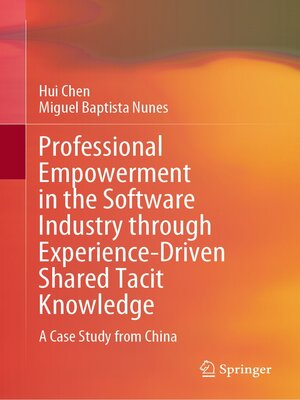Professional Empowerment in the Software Industry through Experience-Driven Shared Tacit Knowledge
ebook ∣ A Case Study from China
By Hui Chen

Sign up to save your library
With an OverDrive account, you can save your favorite libraries for at-a-glance information about availability. Find out more about OverDrive accounts.
Find this title in Libby, the library reading app by OverDrive.



Search for a digital library with this title
Title found at these libraries:
| Loading... |
This book addresses the identification and classification of knowledge acquired through experience that results from engaging in professional activities within the software industry. As a result of this study, the book presents an ontology of such professional activities that require and enable the acquisition of experience and that, in turn, are the basis for tacit knowledge creation. The rationale behind the creation of such an ontology was based on the need to externalize this tacit knowledge and then record such externalizations so that these can be shared and disseminated within and across organizations. The book discusses the very concise manner in which experienced software development practitioners in China understand the nature and value of experience in the SW industry, effectively communicate with other stakeholders in the software development process, are able and motivated to actively engage with continuous professional development, are able to share knowledge with peers and the profession at large, and effectively work on projects and exhibit a sound professional attitude both internally to their own company and externally to customers, partners, and even competitors. The book also discusses the ontology and the qualitative process that are generated by bridging two extremely topical aspects of practice in the software industry, namely, employability skills and competencies. The book is of interest to academics in the areas of knowledge management and information systems, as well as human resources practitioners concerned with selection and development and knowledge and information professionals in software organizations.






